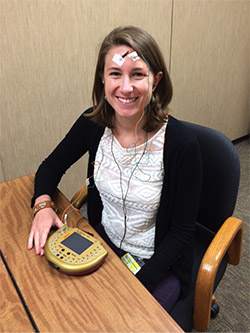
Nelly Papalambros, a third-year graduate student in Northwestern University’s Interdepartmental Neuroscience PhD Program, studies how sound may be used as a therapy to enhance the quality of deep sleep and, as a result, improve metabolism and cognition.
“Sleep deprivation, particularly of deep sleep, has been linked to poor cardio-metabolic functioning as well as problems in cognition,” said Papalambros. “There have been attempts at improving deep sleep with moderate success, but these approaches many times have unwanted side effects.”
With metabolic syndrome on the rise in the U.S., Papalambros aims to determine if sound during deep sleep improves health after two days of acoustic stimulation: participants with elevated cardiovascular disease risk stay overnight at an inpatient sleep research clinic and get a baseline measure of their physiological data such as insulin, blood glucose, hormone and inflammation levels and information about their sleep patterns.
“We are seeing if the sound stimulation has acute effects on their health, but I think this is something that people could need to use over weeks or months to see any long lasting change. The hope is that this is an intervention for people with metabolic problems,” she said.
The sound stimulation is tailored to each person using an algorithm developed by Giovanni Santostasi, PhD, in the lab of Phyllis Zee, MD, PhD, professor in the Ken and Ruth Davee Department of Neurology and director of the Center for Circadian and Sleep Medicine.
The algorithm is set up to read a person’s EEG frequencies, or brain activity, and matches the bursts of sound during certain phases of slow wave sleep. The sound is pink noise, which resembles soft static or humming.
“The algorithm is unique because it can be customized to a specific person, older people have less slow wave sleep and the amplitude of their slow waves is smaller, so it allows you to hone in on that specific person for optimal stimulation,” Papalambros said.
She uses spectral analysis to measure delta waves, which occur in deep sleep, and notes changes in the power of the waves with and without sound stimulation. Using this measurement, Papalambros has observed that in young people, the sound does enhance deep sleep and may also have a positive effect on older adults.
Papalambros also investigates how enhancing deep sleep might improve cognition or memory. Before and after participants sleep, they are given a word pair test. Similar to the metabolism study, participants come in to the clinic for nights with sound stimulation and without sound stimulation.
“Instead of extending the amount of sleep you get, these studies are more about the quality of sleep you get. If we can enhance sleep then hopefully we can improve metabolic function and cognition,” Papalambros said. “Sound is non-invasive and, in theory, this method could be used as a clinical method or even adapted to a smart phone.”






